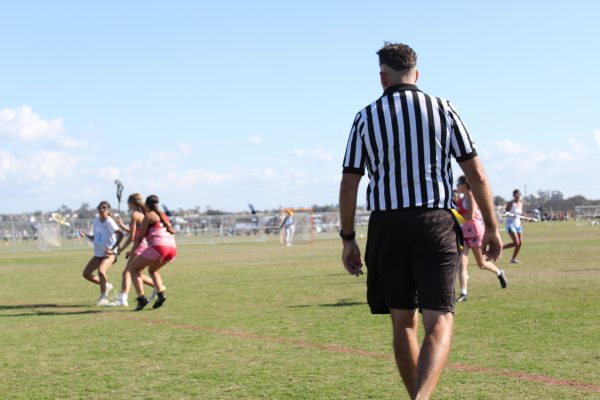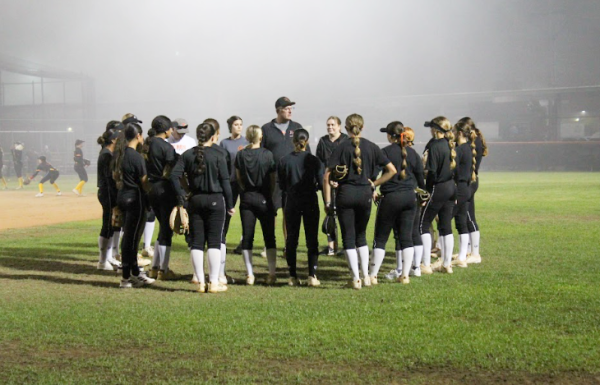Mental Health In Student Athletes
A picture of some of the HBHS girls swim team. (Photography by: Charlotte Nguyen)
Student-athletes are responsible for managing their academic and athletic careers throughout their high school and college years. But what are the effects of this juggling act on one’s mental and physical well-being?
Though the answers were mixed, most of the responses stated that their sport has improved their mental health and provided them with an outlet to work off any stress or anxiety they are feeling from school.
Former Huntington Beach High School (HBHS) student and current Minnesota University swimmer, Summer West, says she often feels happier in the pool. “I’ve mainly noticed positive effects on my mental health from swimming. I usually feel much happier during practice as well as after,” West stated.
West also stated that her college experience has been less stressful compared to her high school experience due to the flexibility in her schedule. “In high school, I felt more pressure just because my schedule was more impacted by school. As a student-athlete in college, now I have harder classes but I’m able to design my class schedule in a way that doesn’t impact my sports”
Dean Carpentier, a current member of the HBHS boy’s baseball team said that no matter the outcome of a game, good or bad, it’s just an indicator of what he needs to improve. Carpentier said, “My mental health is typically affected in a good way through my sport. Whether I do good or bad, it’s always something to work on.”
Carpentier also went on to add that because of the discipline he has learned, he’s able to balance school and baseball easily. “There’s a discipline I have learned where balancing both has become easy but that’s not pressure.”
HBHS cheerleader Lexi Nim, a junior student, has also expressed how cheer and dance have positively impacted her life, but even with the love she has for her sport, she finds herself struggling to balance everything.
“Cheer primarily affects my life in a good way, it keeps me busy and I love it so it brings me joy but if I do start to get stressed out and overwhelmed, it is the first thing to drain me. However, I cannot imagine my life without doing both dance and cheer, but balancing it is hard. Even when people tell me to just choose one or the other (to help with the pressure) I physically cannot, but it drives me crazy sometimes. especially when school gets hectic,” Nim said.
Varsity HBHS senior water polo player Maddy Scarth said, “I’ve found that water polo as an outlet helps keep me focused in school.”
On the other hand, Susie McClintock, a junior HBHS water polo player, has expressed some negative aspects of being a student-athlete. McClintock found herself more stressed and struggling to manage her work and said, “Balancing school and athletics has always been a struggle. Keeping myself organized and not procrastinating helps but something there is too much work and both enough time. As a result, I prioritize my education and skip practice, which results in feeling guilty. I feel like mental health and the struggle with balancing school sports jobs family life and social life needs to be addressed more. and that some adults need to lower their expectations of these kids who fill every minute of their day-to-day life.”
Despite McClintock’s stress, she finds joy in her sport and said, “Though stress from my sport has caused panic attacks, depression, anxiety, and insomnia it can also cause joy from a community and an escape from other parts of my life.”
Pedro Polvo, an HBHS sophomore and soccer player, also expressed the tiring effects of managing both sports and academics. “I have noticed that due to practice I have felt quite tired throughout the rest of my day, making me a bit off task for other things. I have also struggled to balance both soccer and school work, which sort of caused me to sometimes not do well in practice, games, or in school,” Polvo said.
However, stress isn’t the only factor that can weigh on an athlete’s mental health. Coaches can affect the mental states of their athletes as much as any other factor. Tessa King, an HBHS sophomore and swimmer shared her story about how her club coach affects her mental health and love for a swim.
“I had a coach at my club team that made me want to quit swimming, and every time I would have to go I wouldn’t want to. The things that were being said and not getting any motivation and feeling like you weren’t doing good enough and then getting punished with a 500 of fly was horrible. Having to constantly hear ‘It is what it is’ or ‘You guys did better than I thought you would have’ [which] didn’t make me want to try. I noticed that my swimming just got worse I didn’t have any motivation,” King said.
Devyen Trang, a junior on the HBHS girl’s lacrosse team, expressed how her coach’s methods affected her and her team. “Last year my coach caused me to have conflicting opinions about the sport because while I loved playing and loved my teammates, he made it very hard to want to keep playing because of his attitude towards his players,” Trang said.
However, Trang stated that aside from the coaching, her sport has improved her mental health and given her a family. “My mental health is often drastically improved by my sport. I am always a lot happier when I’m in season. I think team sports are amazing at facilitating connections with people that see you at your best and worst and because of that most of my best friends are my teammates,” Trang stated.
In recent years, researchers have found that approximately 30% of women and 25% of men who participate in competitive sports have faced mental health concerns. However, athletes’ responses showcase that the cause of mental health issues isn’t strictly internal. These athletes have shown their unwavering dedication to their sport and academics, it is up to their surrounding peers and coaches to foster a safe environment for everyone.
Your donation will support the student journalists of Huntington Beach High School. Your contribution will allow us to cover our annual website hosting costs.
Thank you for supporting our program!







